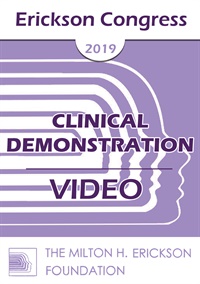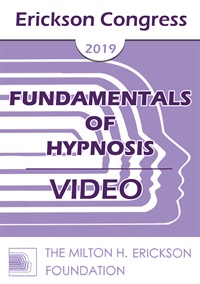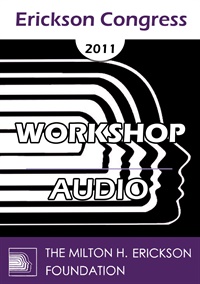
- Average Rating:
- Not yet rated
- Topic Areas:
- Workshops | Hypnosis | Language of Hypnosis | Metaphors | Suggestion
- Categories:
- Erickson Congress | Erickson Congress 2011
- Faculty:
- Norma Barretta, PhD
- Duration:
- 59 Minutes
- Format:
- Audio Only
- Original Program Date:
- Dec 07, 2011
- Short Description:
- Words are the tools of hypnosis. The English language, full of ambiguity, offers remarkable opportunities to embed therapeutic healing messages into the induction and into the body of the hypnotic session. This workshop offers examples and demonstration of multiple meaning and the creative incorporation of linguistic metaphor into therapeutic uses of hypnosis.
- Price:
- $20.00 - Base Price
- Average Rating:
- Not yet rated
- Topic Areas:
- Clinical Demonstrations | Hypnosis | Hypnotic Induction | Language of Hypnosis | Trance
- Categories:
- Erickson Congress | Erickson Congress 2019
- Faculty:
- Norma Barretta, PhD | Jolie Barretta
- Course Levels:
- Master Degree or Higher in Health-Related Field
- Duration:
- 59 Minutes
- Format:
- Audio and Video
- Original Program Date:
- Dec 15, 2019
- Short Description:
- Using a conversational trance induction and developing a deeper level of self-differentiation and autonomy with confidence building.
- Price:
-
Sale is $29.00
price reduced from Base Price - $59.00
- Average Rating:
- Not yet rated
- Topic Areas:
- Fundamentals of Hypnosis | Indirection | Hypnosis | Language of Hypnosis | Yes Set
- Categories:
- Erickson Congress | Erickson Congress 2019
- Faculty:
- Stephen Lankton, MSW
- Course Levels:
- Master Degree or Higher in Health-Related Field
- Duration:
- 1 Hour 52 Minutes
- Format:
- Audio and Video
- Original Program Date:
- Dec 13, 2019
- Short Description:
- The rationale and basic research regarding the use of indirection will be presented. Participants will be guided through several exercises to help them learn and practice the construction of 4 fundamental forms of suggestions and 3 therapeutic binds. A demonstration using these forms will illustrate the implementation of these language techniques for both the induction and therapy.
- Price:
-
Sale is $29.00
price reduced from Base Price - $59.00
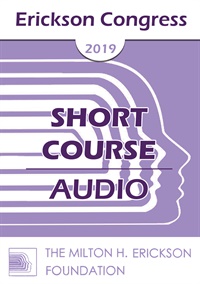
- Average Rating:
- Not yet rated
- Topic Areas:
- Short Courses | Priming | Ericksonian Hypnosis and Therapy Techniques | Language of Hypnosis
- Categories:
- Erickson Congress | Erickson Congress 2019
- Faculty:
- Clifton Mitchell, PhD
- Duration:
- 1 Hour 30 Minutes
- Format:
- Audio Only
- Original Program Date:
- Dec 12, 2019
- Short Description:
- Advances in the priming research have validated the rationale and impact of Erickson’s linguistic techniques. To wit, the priming research has confirmed that we are controlled by an unconscious behavioral guidance system more than previously conceived and, once covertly activated, unconscious goals are just as powerful as or more powerful than conscious goals. To the surprise of many, goals do not require an act of will to be acquired.
- Price:
- $15.00 - Base Price

- Average Rating:
- Not yet rated
- Topic Areas:
- Short Courses | Pain and Healing | Language of Hypnosis
- Categories:
- Erickson Congress | Erickson Congress 2019
- Faculty:
- Rachel Hott, PhD
- Duration:
- 1 Hour 7 Minutes
- Format:
- Audio Only
- Original Program Date:
- Dec 12, 2019
- Short Description:
- How often do we notice our pain, and not our comfort?! Most people only notice pain. When we pay attention to the "sensation," of pain we have a vocabulary that goes from A-Z to explain what we are feeling. For example, aching, biting, caustic, etc. However, when people think about the sensation of comfort, or attempt to describe how they are feeling without pain, they do not have descriptive language except for adjectives.
- Price:
- $15.00 - Base Price
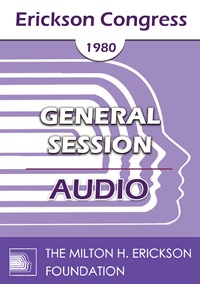
- Average Rating:
- Not yet rated
- Topic Areas:
- General Sessions | Ericksonian Hypnosis and Therapy Techniques | Language of Hypnosis
- Categories:
- Erickson Congress | Erickson Congress 1980
- Faculty:
- Donna M Spencer, MSW | Stephen Lankton, MSW
- Duration:
- 1:52:58
- Format:
- Audio Only
- Original Program Date:
- Dec 08, 1980
- Short Description:
- IC80 General Session 16 - Ericksonian Approaches in Language - Donna M Spencer, MSW, Stephen R Lankton, ACSW
- Price:
- $15.00 - Base Price

- Average Rating:
- Not yet rated
- Topic Areas:
- Hypnotherapy | Invited Addresses | Language of Hypnosis
- Categories:
- Erickson Congress | Erickson Congress 1983 | Pioneers in Couples and Family Therapy
- Faculty:
- Paul Watzlawick, PhD
- Duration:
- 44:12
- Format:
- Audio Only
- Original Program Date:
- Dec 03, 1983
- Short Description:
- Address at the International Congress on Ericksonian approaches to hypnosis and psychotherapy which emphasized the therapeutic potential of language structure over content. Watzlawick critiqued traditional psychotherapy's reliance on reason and linear causality, advocating for techniques like learning the patient's language, avoiding negations, and using metaphors and stories. He also highlighted the importance of non-verbal communication and the right hemisphere's role in therapy. He also discussed the paradoxical nature of reality and the therapeutic use of paradox, suggesting that our perception of reality is more a language game than an objective truth.
- Price:
- $15.00 - Base Price


